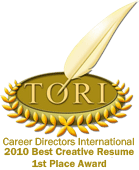
You may not want to face it, but honesty is the best approach to interview questions, even the ones you’d prefer not to answer. Follow these five steps to identify and answer any interview question you’re worrying about.
There’s always one interview question that, well, you’d just rather not answer. Maybe it keeps you up at night before an interview. Maybe you keep hoping they won’t ask. Maybe it even keeps you from launching your job search, though your current position isn’t meeting your needs.
Here’s what to do in 5 steps:
1. Write the question or questions you dread: Defining the problem is the first step. Sometimes, you just have a general feeling of discomfort about the interview. Close your eyes, take three deep breaths, and picture yourself in an interview. What is it you’re worried about? What do you want them not to ask? Write it down. Repeat this until you can’t think of any more questions you dread.
2.Write the answer you do NOT want to give: Write down your “real” answer, the one you are worried about giving. Analyze it. What’s wrong with it? What are you afraid they’ll find out?
Sometimes, your assumption about the answer gets in the way. For example, if you assume you will not be considered for a position if you admit you were fired from your last position, you need to know that is not always the case.
Here’s the thing: Most interviewers respect honesty and integrity. They know it’s not easy to admit a mistake. Most of us have made them. I don’t know anyone who has made it through a whole career without a false start or a detour. Life isn’t that neat and clean.
If you lie, you will be found out. That’s more likely to get you fired than is admitting your mistake in the first place. Most political scandals are way more about the coverup than the original mistake. Same with careers glitches.
3. Write out your answer: Make it honest and brief. Be sure it answers the real question. (Sometimes, the question the interviewer asks isn’t exactly the one they need the answer to. Read more about answering the question behind the question.)
You don’t have to spend half of the interview answering one uncomfortable question. I know it looms that large in your mind, but it doesn’t in anyone else’s, including the interviewer. Don’t dwell on it. Answer it forthrightly.
4. Move on: Usually, there is a silver lining. Find it and use it to connect the experience with a positive outcome. You learned something, the company learned something, you were able to use the experience in training. The turnaround is more important than the mistake.
If you can’t find a positive, you can mention how you took responsibility, corrected it and moved on, how you cleaned up the mess, or whatever fits your circumstance.
5. An example – Answering the “greatest weakness” question: For many people, answering “What is your greatest weakness?” is the part of the interview they despise, and for good reason. It’s not a great interview question because it doesn’t usually produce an answer that means anything.
“I’m a perfectionist” or I work too hard” are classic answers that hardly anyone will a) believe and b) care about.
The real question behind “What is your greatest weakness?” is “What do you do when you run up against a challenge or failure?”
With that in mind, a direct approach is best. Give an example of a time you made a mistake or fell short. Rather than focusing on the weakness or mistake, focus on how you identified and remedied it. What were the results? How did your company benefit?
You will gain much more respect for a candid answer that looks forward than you will by being glib or skating by on a poorly thought out response.
Next Steps
If you’re a good employee, just not a good interviewee, there is hope. You don’t have to be witty and sparkly to win an interview. You may, however, need to spend more time preparing for an interview than the person who is perfectly comfortable thinking fast on his or her feet. If you’ve tried everything else you can think of, ask me about my Interview Preparation Program for the Shy, Nervous, and Fearful. We won’t necessarily get you doing stand-up comedy, but we can substantially increase your comfort in interview situations with some well-targeted preparation.
Related
Avoiding Interview Disaster: Understanding the question behind the question









Wow…Jeri, I found the article to be very informative. As a former job coach myself, we were always simply trained to answer the tough questions a certain way. I am glad you shed some light on this subject for me so I can convey to my clients. The thought process is simple…what don’t you want to say? Great stuff.
Thanks,
John Amos
CEO, Resume MaTrix, Resume Review
Thanks very much, John. I’m happy you found the article useful. I’ve always found memorizing answers to be a futile endeavor. As soon as I get nervous, I forget them. I also found that the “right” answers sounded canned. This way is much more authentic and confidence-producing for my clients. Let me know if you ever want to talk shop!